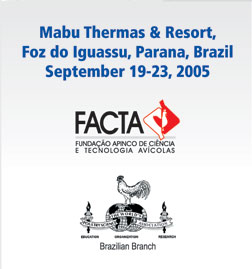Contributed Papers: Oral Presentations
Chemotherapy |
Effects of NatustatTM supplementation on Performance, Feed Efficiency and
Intestinal Lesion Scores of Broiler Chickens Challenged
with Eimeria acervulina,
Eimeria maxima and Eimeria tenella.
C. F. Duffy*1, A. Malaguido#, L. Nollet* and R. F.
Power‡
Alltech Brazil†
* Alltech Ireland Ltd., Sarney,
Summerhill Road, Dunboyne, Co. Meath, Ireland;
# Alltech Brazil, Curitiba, Paraná, Brasil
‡ Alltech Biotechnology Center, Catnip Hill,
Nicholasville, KY 40356, USA.
Corresponding author: C. F. Duffy: cduffy@alltech.com
Intestinal parasitism
is a major stress factor leading to malnutrition and
lowering of performance and production efficiency
of livestock. This is particularly true in the case
of poultry. Coccidiosis is an intestinal infection
caused by species of intracellular protozoan parasites
belonging to the genus Eimeria, resulting in intestinal
lesions, diarrhoea, enteritis, and death. The three
most common species that affect the poultry industry
are E. tenella, E. maxima and E. acervulina.
The effects of dietary supplementation of NatustatTM,
a propriety plant derived product (Alltech Inc., KY,
USA) and Salinomycin, on performance, feed efficiency,
and intestinal lesion scores were observed during
two Eimeria challenge trials in broiler chickens.
In the first trial, chickens were challenged with
Eimeria sp. by infecting the litter with a known amount
of Eimeria oocysts. In the second trial the source
of the Eimeria challenge was the litter from the first
trial and the same treatment groups were assigned
to the same pens as in the initial trial.
Birds were housed in seven pens per treatment, with
55 birds per pen. Performance parameters were recorded
on days 21 and 42 during both trials. Intestinal lesion
scores were assessed on days 14 and 21 during Trial
1 and on day 21 during Trial 2.
Average weight gain and feed conversion ratios significantly
improved in the NatustatTM and Salinomycin treatment
groups when compared to the non-supplemented infected
group. Furthermore, lesion scores were lower on all
sampling days in the NatustatTM and Salinomycin
groups when compared to the non-supplemented group.
However, only lesions associated with E. tenella were
significantly lowered by NatustatTM and Salinomycin
supplementation. NatustatTM and Salinomycin were
equivalent in alleviating the negative performance
effects associated with coccidiosis challenge.
